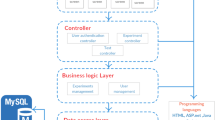Abstract
The technological advances taking place in recent times have led us to consider the use of computers in classrooms as an indispensable tool. This paper details the experience of last year related to the use of different forms of interaction among students and new technological tools. The proposed learning system allows university students to go into computers and specific software in depth get. The use of new tools could enhance the teaching-learning process and adapt it to the new situation of Spanish university system. We have used both, an online platform and specifically designed programs to solve mathematical problems and learn Mathematics.
Access this chapter
Tax calculation will be finalised at checkout
Purchases are for personal use only
Preview
Unable to display preview. Download preview PDF.
Similar content being viewed by others
References
Aliev, R.A., Aliev, R.R.: Soft computing and its applications. World Scientific, Singapore (2001)
Bauldry, W.C., Evans, B., Johnson, J.: Linear Algebra with Maple. John Wiley & Sons, Chichester (1995)
Brooks, J., Brooks, M.: In Search of Understanding: The Case for Constructivist Classrooms. ASCD (1999) (revised edition)
Díaz Len, R., Hernández Encinas, A., Martín Vaquero, J., Queiruga Dios, A., Ruiz Visus, I.: A Collaborative Learning case study: Mathematics and the use of specific software. In: V International Conference on Multimedia and Information Communication Technologies in Education, m-ICTE 2009 (2009)
García-Valcárcel Muñoz-Repiso, A., Tejedor Tejedor, F.J.: Current Developments in Technology-Assisted Education. In: Méndez-Vilas, A., Solano Martín, A., Mesa González, J.A., Mesa González, J. (eds.) FORMATEX (2006)
Hernández Encinas, L., Muñoz Masqué, J., Queiruga Dios, A.: Maple implementation of the Chor-Rivest cryptosystem. In: Alexandrov, V.N., van Albada, G.D., Sloot, P.M.A., Dongarra, J. (eds.) ICCS 2006. LNCS, vol. 3992, pp. 438–445. Springer, Heidelberg (2006)
Hernández Encinas, A., Queiruga Dios, A., Queiruga Dios, D.: Interacción, aprendizaje y enseñanza: Trabajo colaborativo en el aula. In: Proceedings IX Congreso Internacional de Interacción Persona-Ordenador (2008)
Kearsley, G.: Online help systems: design and implementation. Ablex, Norwood (1998)
Kirschner, P.A.: Using integrated electronic environments for collaborative teaching/learning. Research Dialogue in Learning and Instruction 2(1), 1–10 (2001)
Lantz-Andersson, A., Linderoth, J., Säljö, R.: What’s the problem? Meaning making and learning to do mathematical word problems in the context of digital tools. Instructional Science (2008)
Mason, R.: Models of online courses. ALN Magazine 2, 2 (1998)
Moler, C.: Numerical Computing with MATLAB. SIAM, Philadelphia (2004)
Oberhelman, D.D.: Coming to terms with Web 2.0. Reference Reviews 21(7), 5–6 (2007)
Queiruga Dios, A., Hernández Encinas, L., Espinosa García, J.: E-Learning: A Case Study of Chor-Rivest Cryptosystem in Maple. In: International Conference on Information Technologies (InfoTech-2007), Proceedings of InfoTech 2007, Varna, vol. 1, pp. 107–114 (2007)
Queiruga Dios, A., Hernández Encinas, L., Queiruga, D.: Cryptography adapted to the new european area of higher education. In: Bubak, M., van Albada, G.D., Dongarra, J., Sloot, P.M.A. (eds.) ICCS 2008, Part II. LNCS, vol. 5102, pp. 706–714. Springer, Heidelberg (2008)
Weiss, J., et al. (eds.): The International Handbook of Virtual Learning Environments, vol. 14. Springer, Heidelberg (2006)
Wolfram, S.: The Mathematica book, 4th edn. Wolfram Media/Cambridge University Press (1999)
Author information
Authors and Affiliations
Editor information
Editors and Affiliations
Rights and permissions
Copyright information
© 2011 Springer-Verlag Berlin Heidelberg
About this paper
Cite this paper
Queiruga-Dios, A., Hernández-Encinas, A., Visus-Ruiz, I., del Rey, Á.M. (2011). A Virtual Collaborative Environment Helps University Students to Learn Maths. In: Filipe, J., Cordeiro, J. (eds) Enterprise Information Systems. ICEIS 2010. Lecture Notes in Business Information Processing, vol 73. Springer, Berlin, Heidelberg. https://doi.org/10.1007/978-3-642-19802-1_41
Download citation
DOI: https://doi.org/10.1007/978-3-642-19802-1_41
Publisher Name: Springer, Berlin, Heidelberg
Print ISBN: 978-3-642-19801-4
Online ISBN: 978-3-642-19802-1
eBook Packages: Computer ScienceComputer Science (R0)




